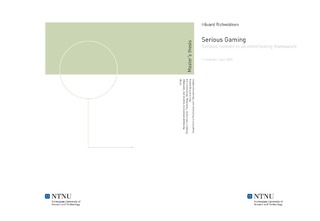| dc.contributor.advisor | Perkis, Andrew | nb_NO |
| dc.contributor.author | Richvoldsen, Håvard | nb_NO |
| dc.date.accessioned | 2014-12-19T13:44:15Z | |
| dc.date.accessioned | 2015-12-22T11:42:08Z | |
| dc.date.available | 2014-12-19T13:44:15Z | |
| dc.date.available | 2015-12-22T11:42:08Z | |
| dc.date.created | 2010-09-04 | nb_NO |
| dc.date.issued | 2009 | nb_NO |
| dc.identifier | 348779 | nb_NO |
| dc.identifier.uri | http://hdl.handle.net/11250/2369415 | |
| dc.description.abstract | This thesis is based on work done at the Norwegian University of Science and Technology (NTNU) in the field of serious gaming. The motivation for the work is to create a serious game with the purpose of recruiting high school students that undertake studies at NTNU within engineering and science. After considerations of several available tools, Blender was chosen as the best development tool for this kind of game, and used to create "Student Quest - A First Person Student Game". The game analysis shows that the game's Primary Learning Principle is Marketing, the Primary Educational Content is Knowledge Gain through Exploration, the Target Age Group is Middle and High School, and it is developed for a Computer Platform. By extracting the fun factors, we conclude that the game passes the Playability threshold and reaches the Enjoyability threshold. By implementing the potential features suggested, the game may reach the Super Fun threshold and thus has the potential of becoming an extremely entertaining serious game. | nb_NO |
| dc.language | eng | nb_NO |
| dc.publisher | Institutt for elektronikk og telekommunikasjon | nb_NO |
| dc.subject | ntnudaim | no_NO |
| dc.title | Serious Gaming: Serious content in an entertaining framework | nb_NO |
| dc.type | Master thesis | nb_NO |
| dc.source.pagenumber | 58 | nb_NO |
| dc.contributor.department | Norges teknisk-naturvitenskapelige universitet, Fakultet for informasjonsteknologi, matematikk og elektroteknikk, Institutt for elektronikk og telekommunikasjon | nb_NO |

